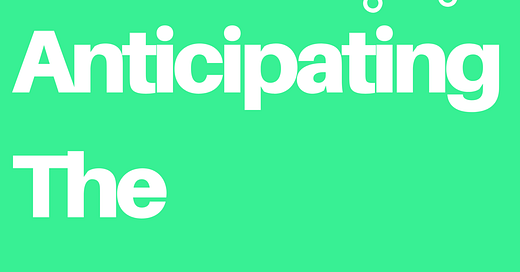This newsletter is really a public policy thought-letter. While excellent newsletters on specific themes within public policy already exist, this thought-letter is about frameworks, mental models, and key ideas that will hopefully help you think about any public policy problem in imaginative ways. It seeks to answer just one question: how do I think about a particular public policy problem/solution?
PS: If you enjoy listening instead of reading, we have this edition available as an audio narration on all podcasting platforms courtesy the good folks at Ad-Auris. If you have any feedback, please send it to us.
- RSJ
Google and the Australian government are on a warpath. There is a proposed new law - the News Media Bargaining Code - that forces Google and Facebook to pay media publishers for links to the news on their sites. While other countries have tried to regulate and make Google and Facebook pay for the content they freely use from news sites, this law is a global first.
The Code
Here’s a brief summary of the Code from the Australian government press release:
The Code will support a diverse and sustainable Australian news media sector, including Australia’s public broadcasters, by:
encouraging the parties to undertake commercial negotiations outside the Code;
enabling digital platforms to publish standard offers, which provides smaller news media businesses with an efficient pathway to finalising agreements with digital platforms;
establishing a negotiation framework under the Code that allows both parties to bargain in good faith and reach binding agreements;
ensuring that an independent arbiter is able to determine the level of remuneration that should be paid under a fair and balanced final offer arbitration model should the parties be unable to reach agreement; and
setting clear and workable minimum standards for digital platforms including requiring 14 days advance notice of deliberate algorithm changes that impact news media businesses.
The Code will initially apply to Facebook NewsFeed and Google Search. Other digital platform services can be added to the Code in future if there is sufficient evidence to establish that they give rise to a bargaining power imbalance.
404 Error
Google’s reaction was swift. It went for broke in its open letter addressed to Australians:
The ability to link freely between websites is fundamental to Search. This code creates an unreasonable and unmanageable financial and operational risk to our business. If the Code were to become law in its current form, we would have no real choice but to stop making Google Search available in Australia.
For Google, search is free and neutral. Its proprietary algorithm takes your search term, trawls the net, ranks the relevant sites and presents to you a million search results in order of what it thinks will be most useful to you. This is free because that’s Google’s mission - to organize the world's information and make it universally accessible and useful. Along with your search results, it throws up a few relevant ads that might be of interest to you based on your search. These are clearly identified and highlighted as ads. It makes money through them. Search and ads are different silos for it. There’s a separation (or so Google would have us believe) between the church and the state
For Google, paying news publishers to link people to their websites is a slippery slope. Other businesses will soon demand for the same. The search algorithm will no longer be pristine. Soon there will be bidding wars to appear higher on the search ranks. The whole principle of open internet will be vitiated.
The Australian government responded to Google’s open letter with PM Morrison indulging in some plain speaking:
“We don't respond to threats. Australia makes our rules for things you can do in Australia. That's done in our parliament. It's done by our government. And that's how things work here in Australia."
Meanwhile, Facebook decided yesterday it will block its users and news publishers from posting links to news sites because of the Code.
Best Of Both Worlds?
So, how should we think about this?
Well, first let’s get all the good that Google has done for the world out of the way. Google has been the among the most transformational tools ever made available to humankind. It deserves its extraordinary profits and market cap.
But there have been unintended effects of its dominance especially for news media. News publishers have lost customers as print has fallen out of favour. Their digital properties don’t draw in as much ad revenues and most traffic to them is routed through Google or Facebook. Classifieds which were the other source of their revenues have also gone online. The subscription model might be the way forward but no one has really seen it scale. It still looks like a niche game.
There’s hardly a viable business model to run a mainstream newspaper with extensive ground reporting, investigative pieces and deeply researched stories. What has replaced these are free websites with commoditised news from the wire, paid articles masquerading as news, listicles with clickbait-ey headlines and, of course, fake news or disinformation sites with specific political agenda. Poor quality news for free will drive away good quality reportage - that’s the Gresham’s Law for media.
The downstream impact of this in culture and politics has been huge. If this were to continue and the price for news nudges towards zero, the supply of news will also be eventually zero. All we will be left with is views, opinions, hearsay and manufactured disinformation.
The question therefore is this. Does the bargaining code like that’s being taken to the Australian parliament solve this problem? Sure, Google will be forced to come to the table and negotiate a deal with the publishers. This will mean some additional revenues for them to support journalism that matters to them. But let’s play this out a bit. Different media houses will have different bargaining power. The smaller ones who might be doing cutting edge work won’t have any power to cut a deal for themselves. Google will now have an incentive to push certain types of links over others. Maybe it will present the links from sites whom it doesn’t have to pay on top of its results. You might have the cheaper, low quality journalism being promoted. More Gresham’s Law in action. Will that be a good outcome? Or, will Google play arbiter in ranking the results based on what’s the best commercial deal for it? It will interfere in the search results. Remember it is a publicly listed company. It will do what’s in the best long-term interests of its shareholders.
Lastly, there’s a more fundamental shift in the business model of the traditional news publisher that’s needed for them to survive in the long run. An annual boost of income from Google is welcome but not enough. The ability to unbundle their core product, using digital tools to deliver news beyond the written form, flexible subscription options and continuing to invest in content are all steps many of them have taken to remain relevant. They will have to continue investing in them and thinking beyond to fight the good fight.
Google itself has worked on a solution to compensate publishers through its platform called Google News Showcase. As the Google open letter said:
“With News Showcase, we would pay for publishers’ editorial expertise and for beyond-the-paywall access to news content for users—not for links to news content.”
But the hitch here is the News Showcase doesn’t exactly even the playing field between Google and media outlets. Google has unilaterally decided this is a model that works best for others and it’s now their way or the highway. It’s a bit odd that an organisation that wants to convince the world it isn’t a bully should use a one-size-fits-all model for all publishers or threaten exiting a country because it doesn’t like a proposed new law. It does the exact opposite. The natural question that comes up is if every other country follows the Australian model, will Google exit them all?
A more flexible and negotiable News Showcase model is possibly a better option than the News Media Bargaining Code approach that’s being thrust upon Google in Australia. The principles of open internet and free search are too critical to be compromised. It is in Google’s interest to continue to make its model more palatable to publishers than have governments interfere in a space where there’s no real market failure. It appears that’s the way it is going after the strong response it received from the Australian PM. The deal it struck with Nine Entertainment yesterday seems to suggest that. This wasn’t possible even two weeks back:
A fortnight ago Nine was dismissive about the Showcase product, insisting it would not negotiate with Google until the law was passed.
“This is what monopolies do, they put an offer, in the form of Google Showcase, but not offer to negotiate,” a Nine spokesperson said at the time.
“It has to be all on their terms and that is not an approach we will participate in. We support the legislation the government is proposing as the best way to secure a fair payment for our content.”
The impending law seems to have got Google back to the negotiating table. If that’s what the law intended to do, it is a good lesson for Google to be proactive about offering flexibility to media platforms world over. We need good quality journalism that’s financially viable and we need an open internet. There shouldn’t be a trade-off between them.
HomeWork
Reading and listening recommendations on public policy matters
A quick primer by The Guardian on the proposed Australian law and its background
Tim Berners-Lee in The Guardian: “Australia's proposed media code could break the world wide web”











Share this post